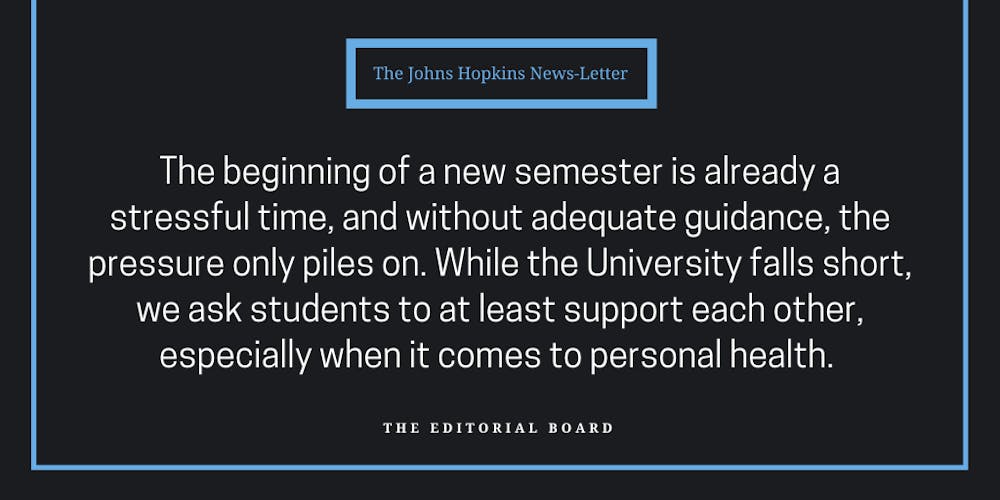Every new school year brings change: different professors, different classmates, maybe even a different go-to order at Brody Cafe. But some of the recent changes on campus have us scratching our heads, wondering how and why the University has decided to alter key policies.
Hopkins has made some exciting steps forward in our incremental return to “normal,” from hundreds of in-person classes to a bustling Student Involvement Fair in the Rec Center. Yet, it seems the University has taken a step back when it comes to prioritizing students’ health and safety.
One of the most drastic differences from last semester is the relaxing of COVID-19 guidelines. The University no longer requires asymptomatic testing or masking for any students, regardless of vaccine exemptions. Additionally, there are no longer any restrictions on events, gatherings and dining.
Previously, the University prioritized isolation housing for on-campus students because congregate living situations made isolation in place difficult. This semester, however, isolation in place is the default; only limited alternative accommodations will be made.
Meanwhile, COVID-19 variants keep getting more contagious, and AMR double bedrooms haven’t gotten less cramped. We struggle to understand why Hopkins would eliminate such a vital provision against the spread of COVID-19, while the pandemic continues to kill hundreds of Americans each day.
The Centers for Disease Control and Prevention recommend receiving a flu vaccine by the end of next month and omicron-targeting COVID-19 boosters. Last year, Hopkins promoted their clinics for the COVID-19 boosters and flu shots, both required for on-campus students. While there are flu shot clinics listed on the website, there hasn’t been any University-wide communication about them or the omicron-targeting boosters.
Not only is Hopkins slacking when it comes to preventative measures like vaccination, but they’ve stayed mum on the current spread of COVID-19 on campus. The recent uptick in cases among students — over 100 in the past week — is concerning, and the numbers likely paint just a fraction of the picture. Since testing is now completely optional, the true number of positive cases is anyone’s guess.
Even when students know they’ve been exposed, the University’s testing recommendations are unclear on whether these students should test. This lack of clarity is only exacerbated by the return to in-person classes. Naturally, students have always dreaded a positive COVID-19 test, but now they have to worry about their attendance suffering in addition to their health. When students were sick last semester, they could keep their peers safe and catch up on lectures at home. Now that fewer lectures are recorded, students risk falling behind if they test positive.
The relaxing of University-wide restrictions has given free rein to professors to determine COVID-19 policies for their respective classrooms. With each professor taking a different approach to accommodating sick or immunocompromised students, there is no standardization across classes. On top of everything, students and professors alike must now adjust to the shift from Blackboard to Canvas.
Despite so much change occurring at once, the University is failing to provide necessary support to students. But we can’t say we’re surprised; this semester isn’t the first time this type of “do it yourself” culture has been perpetuated at Hopkins.
Recalling this time last year, a disabled student spoke up about failing to receive the necessary accommodations to succeed at Hopkins. The student’s concerns, which have yet to be resolved, reflect the University’s inadequate approach to supporting the disabled community.
This issue is even more pressing given the potential effects of COVID-19, which can last beyond the infection period. Long COVID, with symptoms ranging from breathing difficulties to hypertension, may qualify as a disability under the Americans with Disabilities Act. As thousands of positive cases last year, it can only be expected that some are struggling with long COVID. The question remains whether the University will address the long-term complications of the virus and support students grappling with its effects.
The beginning of a new semester is already a stressful time, and without adequate guidance, the pressure only piles on. While the University falls short, we ask students to at least support each other, especially when it comes to personal health. Whether someone is masking or not, respect each other’s decisions. At the end of the day, we’re all in the same boat, doing our best to navigate confusing waters in the new school year.





